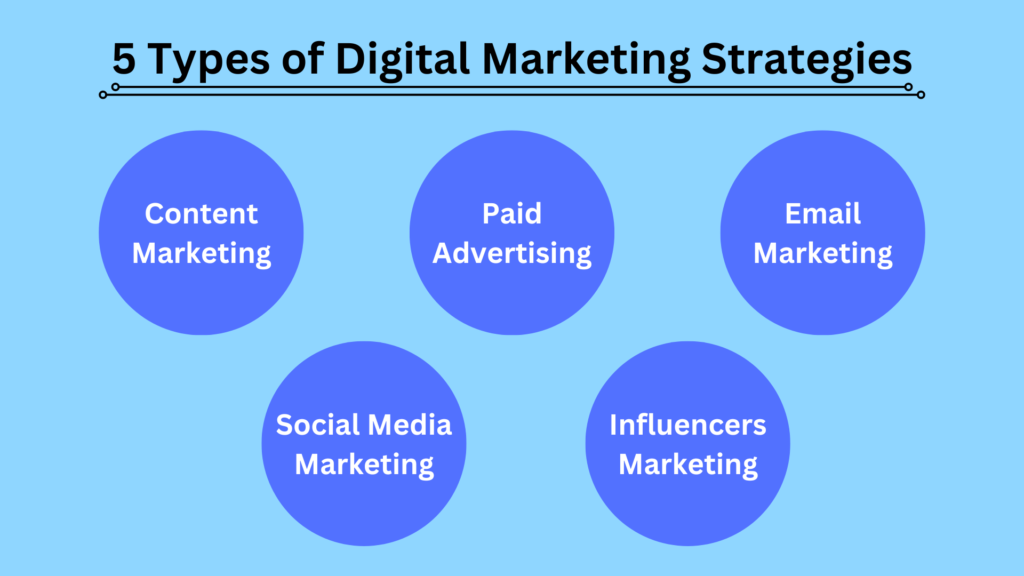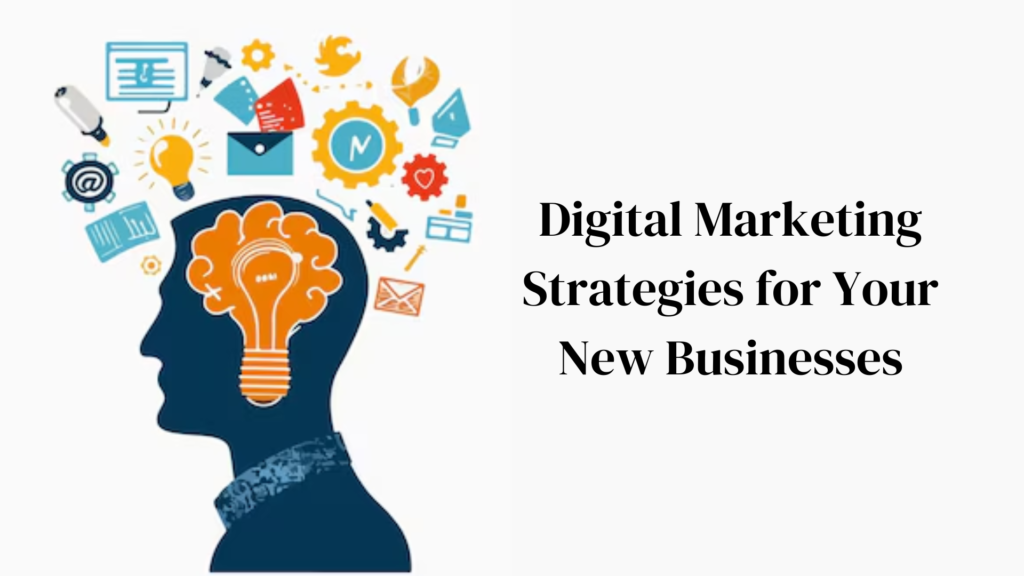Starting your own business is both challenging and exciting. It’s a ride that has its own ups and downs. But behind every successful startup is a solid marketing strategy. This strategy determines where, when, and how you engage with potential customers to sell your brand.
Your marketing should send a positive message. One that resonates with your audience and makes them feel connected to your brand. Start by asking yourself, why does my business exist? What problem does it solve? Use this guide to get answers to all your questions and build the best marketing strategy for your startup.
You may know how to start a business, but the real work starts afterward. From creating a strong brand to building an online presence, here are five strategies to help with marketing for startups.
What is a Digital Marketing Strategy?
Digital marketing for startups is a plan to promote a product or service online. The goal could be to promote your brand or reach specific revenue targets. This strategy operates entirely on digital platforms like search engines, websites, or social media.
The best marketing strategies start with constructing an online presence. This should include ideas that will create the framework for your plan. To develop an optimal strategy, business owners must identify their potential customers and channels through which they’ll target them. You’ll need to figure out which marketing initiatives and ideas will help your business the most.
Why Digital Marketing Strategy Is Important

You may know you need a marketing strategy, but do you know why it’s crucial? A solid strategy is the backbone of your business’s online presence. Without it, your efforts might fall flat.
Here are a few key reasons to focus on building a strong digital marketing plan.
1. Understand Market Share
A clear strategy gives you a better understanding of your marketing share. With this understanding, you might misjudge your product or service demand.
Having a solid plan gives you a deeper understanding of the marketplace. This helps you make informed decisions and stay ahead.
2. Competitors Gain Market Share
If you don’t have a digital marketing strategy, your competitors likely do. They’ll use it to gain market share while you rely on outdated tactics.
You need to invest in digital marketing to stay visible to your target audience. Without a strategy, you risk being left behind as your competition takes over the market that could be yours.
3. Online Value Proposition
Developing the best marketing strategy helps you create a strong proposition. This proposition enhanced the user experience, making it easier for customers to buy from you.
Your goal is to appeal to different types of buyers. Make your brand attractive to everyone by offering the right price and making it easy to buy.
4. Know Your Customers
Using user feedback tools helps you identify target customers’ feelings about your products or services. In the digital world, gathering customer feedback through surveys and reviews is simple. This information helps you focus on what works best for your business.
5. Be Agile in a Competitive Market
Top brands are always changing and improving. They keep up with the competition by staying ahead of what customers want. Your business should be the same. Be flexible and ready to adapt to changing customer needs.
Here’s how to get started in 3 steps.
1. Outline your strategy
Every startup’s marketing strategy should be unique. However, all successful strategies share four key components: goals, audience, market research, and budget.
Each plays a crucial role in shaping your plan, so let’s break it down step by step.
2. Define Your Goals
The definition of success can vary from the day you begin your business till today. So, the main question remains: what does success mean to you? For many startups, it’s about getting more people to know your brand and finding new customers.
Although both are important, it’s crucial to prioritize the goals that align most closely with your current needs and objectives.
- Raise Brand Awareness: Marketing tactics for small businesses should focus more on introducing yourself to potential customers. People need to know who you are, what you offer, and what makes you different from the rest. If brand awareness is your priority, you should focus on promoting your name, logo, or products to ensure they stand out in the market.
- Acquire new customers: If your focus is on acquiring new customers, your goals might include signing up new users, encouraging them to use your product, or actively converting leads into customers. Brands should focus on compelling design, persuasive copy, and strong calls to action.
3. Find your Marketplace
A study by CB Insights shows that lack of demand is the second leading reason start-ups fail. Sometimes, the product or service doesn’t solve a real problem or isn’t unique enough to stand out from competitors. Other times, the focus is too narrow, and there aren’t enough potential costumes to grow a successful business.
To make it big in the thigh, startup owners must take the time to research other products in the market. Study the interests of potential customers. Once they confirm there’s enough demand, they must start spreading the word around the market.
Set Your Budget
Your marketing budget depends on your startup’s costs and income. But spend your money wisely, no matter how much you have.
Focus your marketing efforts on what you want to achieve. If something doesn’t work, don’t be afraid to change your strategy or try new things.
As your business and budget grow, you can invest more in marketing and reach new customers.
5 Types of Digital Marketing Strategies
These are 5 different types of marketing strategies:

1. Content Marketing
Content marketing is one of the most reliable and effective strategies for businesses. With content marketing, brands create helpful, interesting content for their target audience. This content attracts potential customers and keeps them interested in your brand.
Blogging is one of the most common types of content marketing. When you post a blog, you don’t sell your product. Instead, give readers valuable advice and information. For example, a general contractor might blog about home maintenance. This builds trust and makes people see you as an expert. You could also share holiday tips or recipes to show your human side.
Writing a blog is easier said than done. One needs to have proper knowledge about SEO to get their blog ranked. So, always trust a professional to do your website’s SEO.
2. Paid Advertising
Most business owners are familiar with paid advertising. Traditionally, this includes ads on TV or radio. In the digital world, paid ads appear on websites, search engines, or social media platforms.
Digital ads are popular because they are cost-effective. They are much cheaper than traditional ads and can target audiences more precisely.
3. Email Marketing
Email marketing is a powerful way to connect with your audience and keep them engaged. Start by adding a form to your website or landing page to collect email addresses from visitors.
Once you have their contact information, send updates about the services, products, or content they might enjoy. By collecting information like their birthday, interests, or location, you can create personalized content that speaks directly to their needs. This makes your emails even more relevant and valuable to your audience.
4. Social Media Marketing
Social media marketing uses social media platforms to promote and sell products or services. Though it sounds very similar, social media marketing is very different from paid ads. Here, businesses share new and curated content that the audience finds valuable.
You can post reviews, testimonials, memes, infographics—anything that educates or entertains. The goal is to build a loyal following to which you can market directly.
5. Influencers Marketing
Influencers are people with large social media following. Their popularity comes from their content or celebrity status.
When an influencer promotes your brand, it can significantly boost your visibility and increase sales. Essentially, they endorse your product or service to their audience.
Some charge for this, while others might do it for barter collaboration. Each influencer is different, so contact them to see what they want.
Wrap Up
Building the best digital marketing strategy is essential for startups to succeed in today’s competitive market. By understanding your goals, target audience, and market research, you can create a plan that effectively promotes your brands and drives growth.
If you’re looking for help from professionals to ensure you get the best results, contact Milestone Marketing. We are America’s leading digital marketing agency that specializes in helping startups develop and implement winning strategies. Our team of experts can assist you with everything from brand awareness and customer acquisition to content marketing and influencer partnerships.



